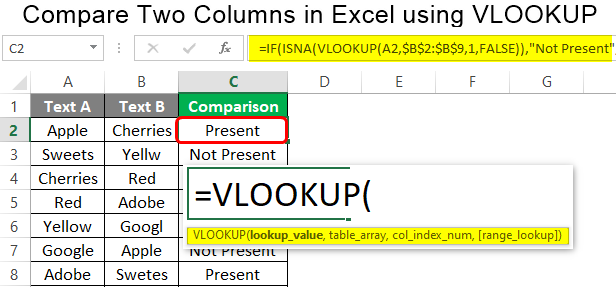5 Ways to Compare Data in Excel Sheets

Comparing data across multiple Excel sheets can be a critical task in various professional and personal scenarios, like reconciling financial records, inventory tracking, or analyzing different sets of data from experiments. Excel offers several powerful tools to assist with this task, ensuring accuracy and efficiency. Here's how you can effectively compare data in Excel sheets:
1. VLOOKUP Function

The VLOOKUP (Vertical Lookup) function is perhaps one of the most commonly used tools for comparing data:
- Purpose: VLOOKUP allows you to search for a value in the first column of a table array and return a value from the same row in another column.
- How it Works:
VLOOKUP(lookup_value, table_array, col_index_num, [range_lookup])lookup_value: The value to search for.table_array: The range of cells that contains the data.col_index_num: The column number in the table from which to retrieve the value.[range_lookup]: TRUE for an approximate match or FALSE for an exact match.
- Example: Suppose you’re comparing Product IDs between two sheets. You could use:
This would look for the value in cell A2 of the current sheet within Sheet2’s A:B range and return the corresponding value from the second column.VLOOKUP(A2, Sheet2!A:B, 2, FALSE)
⚠️ Note: VLOOKUP can only look to the right for values. For left-side lookups, consider using INDEX/MATCH or XLOOKUP.
2. Conditional Formatting

Conditional Formatting is an excellent visual tool for comparing data:
- Purpose: To highlight cells that meet specific criteria, making differences stand out visually.
- Steps:
- Select the range or entire sheet you want to compare.
- Go to ‘Home’ tab > ‘Conditional Formatting’ > ‘New Rule’.
- Choose “Use a formula to determine which cells to format.”
- Enter a formula like
=A1<>Sheet2!A1to highlight cells that differ between sheets. - Set the format you want for the differences (e.g., color, font style).
- Benefits: It’s quick, easy to implement, and visually intuitive for spotting anomalies.
⚠️ Note: Conditional Formatting rules can slow down Excel if overused. Use them judiciously.
3. INDEX/MATCH Functions

While VLOOKUP is limited in looking to the right, INDEX/MATCH provides a more flexible lookup:
- Why Use Them: INDEX and MATCH can look up data in any direction (left, right, up, or down).
- How it Works:
INDEX(array, MATCH(lookup_value, lookup_array, match_type))INDEX(array, row_num, [column_num]): Returns the value of a cell in a table based on the row and column numbers.MATCH(lookup_value, lookup_array, [match_type]): Returns the relative position of a lookup value within a lookup array.
- Example: To find a product name from Sheet2 based on the ID in Sheet1, use:
=INDEX(Sheet2!B:B, MATCH(Sheet1!A2, Sheet2!A:A, 0))
⚠️ Note: Combining INDEX/MATCH is very versatile but can be complex for beginners.
4. Using Power Query for Advanced Comparisons

Power Query is Excel’s data transformation engine:
- Functionality: It allows for complex data merging, cleaning, and comparison across multiple sheets or workbooks.
- Steps:
- Go to ‘Data’ tab > ‘Get Data’ > ‘From Other Sources’ > ‘From Workbook’ to load your sheets into Power Query.
- Use ‘Merge Queries’ to combine data based on key fields like ID or name.
- Filter or group data to identify mismatches or differences.
- Benefits: It’s highly customizable, handles large datasets well, and can automate repetitive data comparison tasks.
⚠️ Note: Power Query is available in Excel 2016 or later versions. For earlier versions, consider third-party add-ins or manual comparison techniques.
5. Macros for Custom Comparison

For advanced users or when standard methods fall short, VBA macros offer tailored solutions:
- Why Use Macros: Custom macros can automate complex data comparison tasks, especially when dealing with large datasets or multiple criteria.
- How to Implement:
- Open the VBA Editor with Alt+F11 or through the Developer tab.
- Create a new module and write your comparison code.
- Your macro could highlight differences, send alerts, or generate reports.
- Example: A macro could loop through two ranges, comparing each cell and then formatting or reporting on differences:
Sub CompareSheets() Dim ws1 As Worksheet, ws2 As Worksheet Dim rng1 As Range, rng2 As Range Dim cell1 As Range, cell2 As RangeSet ws1 = ThisWorkbook.Sheets("Sheet1") Set ws2 = ThisWorkbook.Sheets("Sheet2") Set rng1 = ws1.Range("A1:Z100") Set rng2 = ws2.Range("A1:Z100") For Each cell1 In rng1 Set cell2 = rng2.Cells(cell1.Row, cell1.Column) If Not IsEmpty(cell1) And Not IsEmpty(cell2) Then If cell1.Value <> cell2.Value Then cell1.Interior.Color = RGB(255, 0, 0) 'Highlight differences in red End If End If Next cell1End Sub
⚠️ Note: Macros can be powerful but require some coding knowledge and can pose security risks if not used cautiously.
Wrapping up, Excel provides an arsenal of tools for comparing data across sheets. From basic functions like VLOOKUP for single-column lookups to the comprehensive capabilities of Power Query for complex data handling, each method has its place. Remember, the choice of method depends on your specific needs, the size of your dataset, and your proficiency with Excel. With practice, comparing data becomes an efficient and insightful task, leading to better decision-making and streamlined workflows.
Can VLOOKUP look left?

+
No, VLOOKUP cannot look left. It can only retrieve values to the right of the lookup column. For left-side lookups, use INDEX/MATCH or XLOOKUP.
How can I highlight differences between sheets?

+
Use Conditional Formatting with a formula like =A1<>Sheet2!A1 to automatically highlight cells that differ between two sheets.
What if my data is too large for standard functions like VLOOKUP?

+
Consider using Power Query for merging and comparing large datasets, or if you’re comfortable with VBA, write macros for custom comparison logic.
How can I compare data that changes frequently?

+
Set up a VBA macro that runs comparisons and reports on differences or highlights them. This can be automated to run at specific intervals.